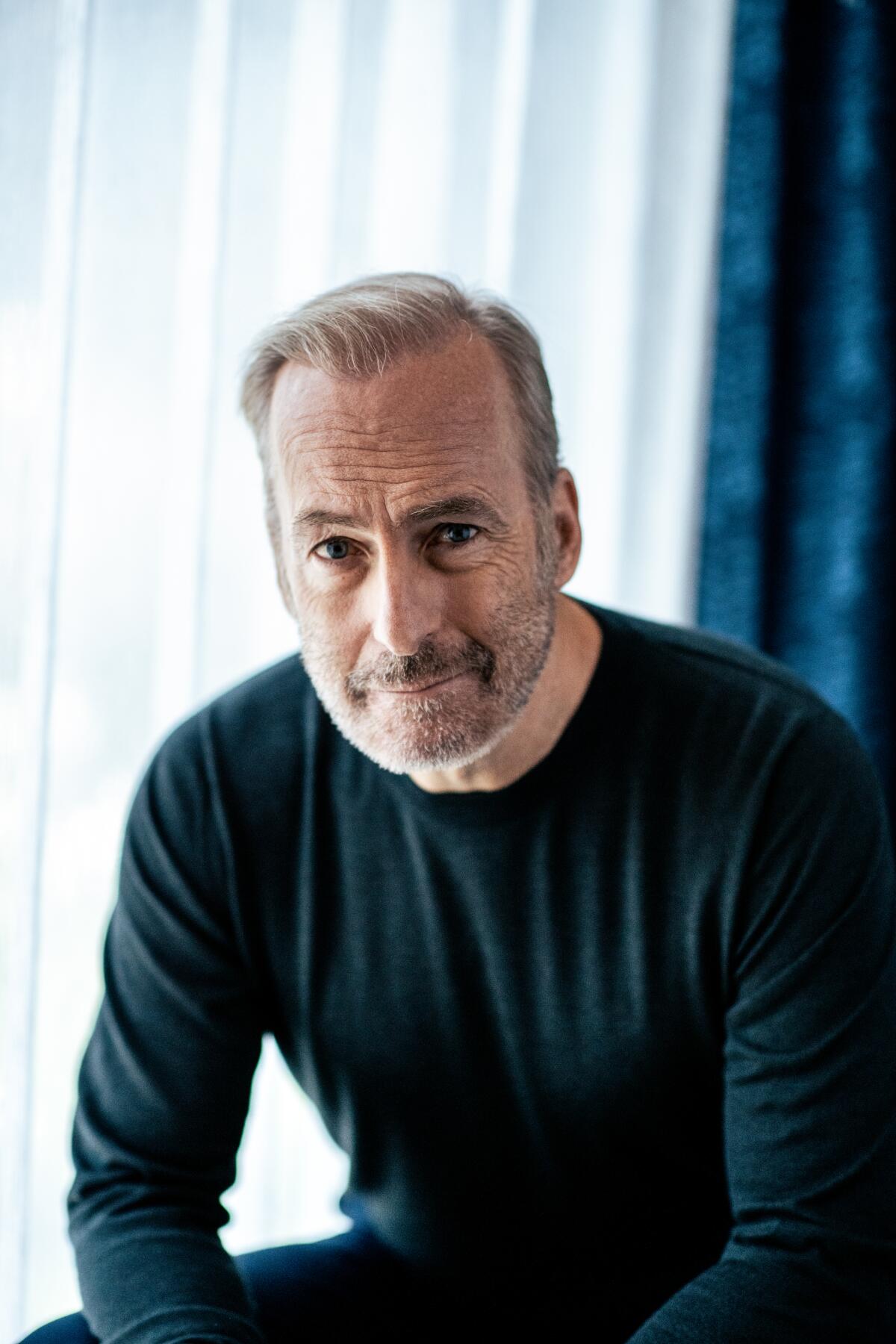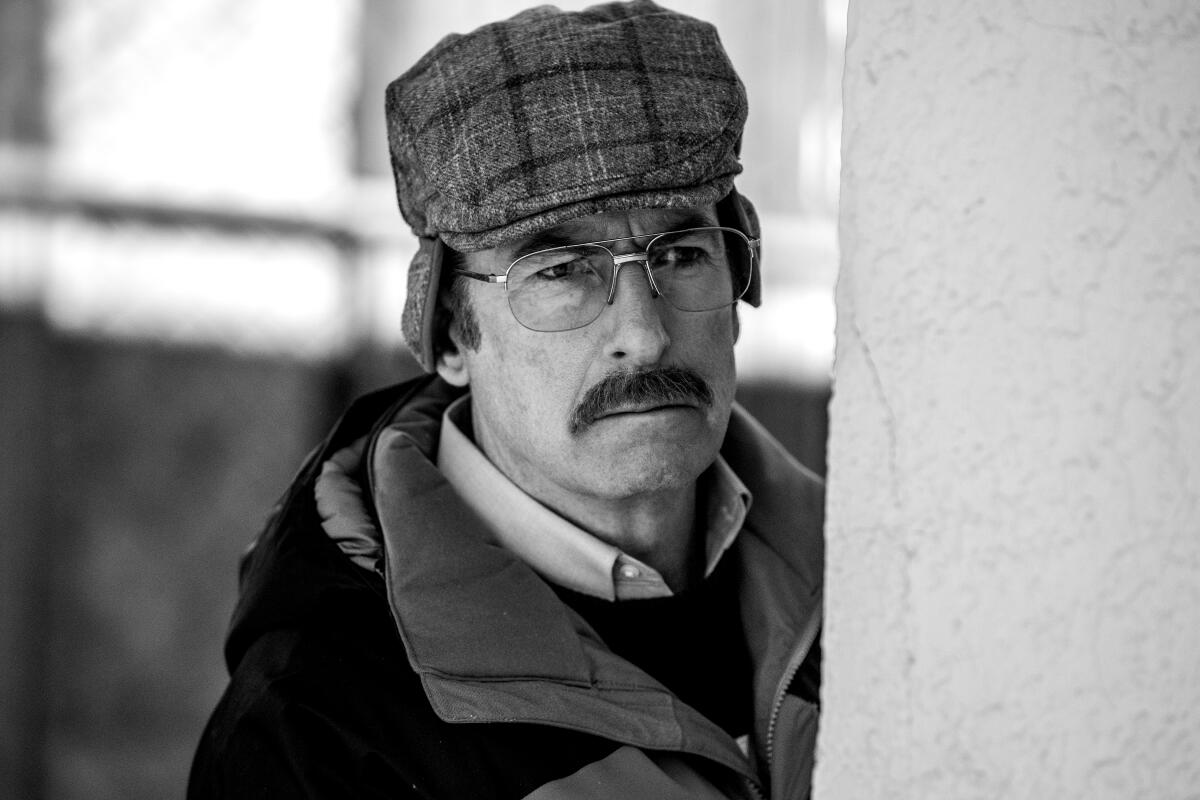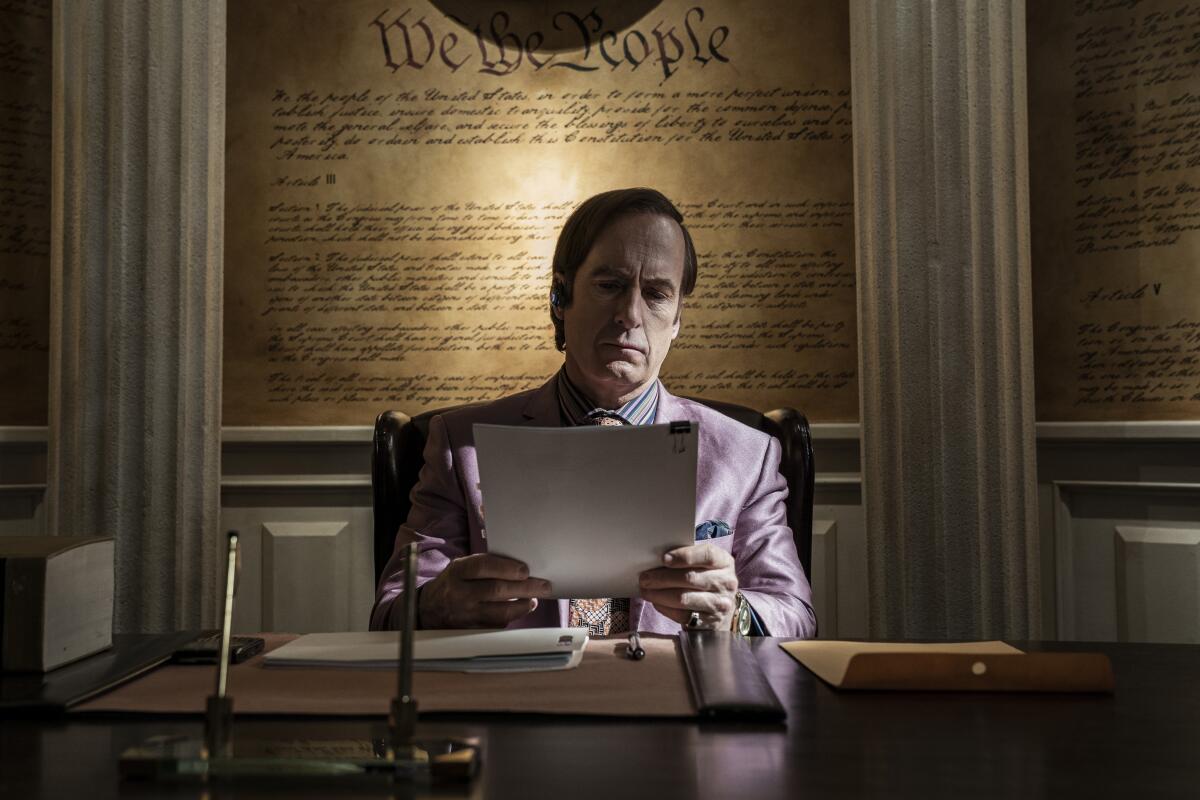The complete guide to home viewing
Get Screen Gab for everything about the TV shows and streaming movies everyone’s talking about.
You may occasionally receive promotional content from the Los Angeles Times.

The following story contains major spoilers for the series finale of “Better Call Saul.”
Bob Odenkirk has always been keenly aware that “Better Call Saul,” the prequel to “Breaking Bad” in which he plays shady attorney-in-the-making Saul Goodman, would end when it merged with that landmark drama.
The day arrived Monday with the series finale, titled “Saul Gone.” Odenkirk is wrestling with his emotions as the curtain descends on the character he has played for six seasons as the lead of “Better Call Saul” and an additional four as a recurring player on “Breaking Bad.”
“I’m a little shattered about it,” he said, a trace of melancholy creeping into his voice as he looked down at a table. “It’s going to be hard. I’ve been asked many times over the last month what it’s like with the show ending. It’s not something I’ve really thought about because I’m protecting myself emotionally. Compartmentalization is a real mechanism. The truth is, I’m trying to let myself feel it. And it’s going to hit me.”
But when asked how he feels about the final episode, which was written and directed by co-creator and showrunner Peter Gould, his face brightened.
“I love the finale and where it goes,” Odenkirk said. “You see a guy who thinks he’s running toward something, but he’s actually been running away. And he’s going to stop running.”
The fugitive attorney, who has been hiding with a new identity as Cinnabon manager Gene Takavic, finally ends up behind bars, but he finds redemption in his punishment for multiple crimes, including accessory to murder and money laundering. And he has a brief but poignant reconciliation with his ex-wife — and occasional partner-in-crime — Kim Wexler (Rhea Seehorn). Among its many shifts in tone, including explosions of brutal violence, “Better Call Saul” is at its core a tragic love story.
Said Odenkirk: “People who are dialed into the show like I am will feel the same way I did when I first read it. There’s a degree of self-awareness this character gains that I always knew he was capable of. It was almost frustrating for me that he hadn’t shown it. But in the final episode, he surrenders to the self-awareness he’s always had. It’s pretty cool and very satisfying to me.”
Much of “Better Call Saul” depicted events that took place before the action of “Breaking Bad, which ended its five-season run in 2013. That drama followed Walter White (Bryan Cranston), a meek high-school chemistry teacher stricken with cancer, as he gradually morphed into a ruthless drug kingpin known as Heisenberg.
Emmy nominee Rhea Seehorn breaks down the ‘Better Call Saul’ series finale, opens up about Bob Odenkirk’s heart attack and more.
“Better Call Saul” had a parallel concept, depicting how mild-mannered attorney and semi-reformed con artist Jimmy McGill evolved into the crooked Saul Goodman who entered into a dangerous alliance with Heisenberg in the original series.
Among the highlights of “Saul’s” final episode were scenes featuring White; McGill’s more accomplished but troubled attorney brother, Chuck (Michael McKean); and Marie Schrader (Betsy Brandt), the widow of slain DEA agent Hank Schrader (Dean Norris).
One of the main set pieces in the finale is a courtroom scene in which Goodman, who has cannily negotiated a plea deal that will greatly reduce his prison sentence, switches gears and confesses to all his crimes — and the motivations behind them — as Wexler and Schrader look on.
“The courtroom scene was hard,” Odenkirk said. “We did it over the course of three days. And then I asked to re-shoot it even after we got it. It’s a huge scene. It’s the biggest journey the character makes in the whole series.”

He also pointed to his final two scenes with Seehorn: one where they’re sharing a cigarette together in a holding cell, and another where they take one last look at each other as she exits the prison.
Said Odenkirk: “The scene in the holding room was a big deal for us, and it felt incredibly organic and natural, the feelings of acceptance and love at a level they’ve never shared before. Rhea and I have always felt these characters were very emotionally intelligent. They were bigger people than they had shown themselves to be, and that scene grants them that intelligence as well as the bravery to do that — to own their shortcomings.”
Fans are likely to feel as emotional as Odenkirk about the ending, which the actor pointed out is markedly different from that of “Breaking Bad,” which concluded with a hail of gunfire and a high body count: “The ending of ‘Breaking Bad’ was utterly perfect. But this was more psychological and quieter and slower. It’s deeply about character.”
Odenkirk’s filming the final season was unexpectedly halted in July 2021 when he collapsed on the series’ New Mexico set after suffering a heart attack. He returned to work in September after a hospital stay and recovery at home.
The 47-year-old actor on being written off by Hollywood, how he checks the writers’ Spanish and the main way he differs from Lalo Salamanca.
That ordeal changed his perspective on the experience of playing his less-than-reputable persona on “Better Call Saul.”
“The most surprising thing about this journey is the love I felt from the public,” Odenkirk said. “I play a character, who, while he reveals earnest sides of himself and can be very likable, most of the time he’s doing unethical, unjustified stuff. He’s not a great guy in a lot of the actions he takes. He’s vindictive, resentful and careless a lot of times. The fact that I had a heart attack and people responded with love and concern, after knowing me through this character? I’m still flabbergasted.”
The series finale concluded a two-part season that once again captured the qualities that have elevated “Better Call Saul” to the elite ranks of television dramas, with many fans and critics saying it is just as good as, if not better than, “Breaking Bad.”
Taking on the lead role was life-changing for Odenkirk, who was previously known for his success in the comedy world — he’s a former “Saturday Night Live” writer and co-creator with David Cross of the “Mr. Show” sketch comedy series.

He called the experience “a scary adventure” while sipping a drink at a boutique West Hollywood hotel a few days before the broadcast of the finale.
“You know how lucky I was to get this role,” said Odenkirk. “I didn’t audition for Saul for ‘Breaking Bad.’ I didn’t expect to do more than three episodes. Then I had a great time doing more. He was a joker and fun to play. There was this chatter about him having his own series, but I didn’t put any stock in that. I didn’t hope for that. Then we went out and made the show.”
The actor-writer grew increasingly anxious as the project gained momentum.
Said Odenkirk: “I got scared on a deep, existential level when I started to play this guy, and he got deeper and deeper. I worried about being a public figure, because I know that everyone who loved ‘Breaking Bad’ — which is everyone — was going to watch this, or at least sample it. There was this great show that people were going to judge me against. That was really hard. I don’t think I shared that with people, how much that took out of me.”
The actor waited 10 years to make his TV directorial debut. He spoke to the Times about getting the call and key creative choices in ‘Axe and Grind.’
Playing McGill, whose eager-to-please manner and good intentions were often derailed by a flexible moral compass, was particularly difficult.
“He’s a guy who is showing the audience his need, his hunger for love and respect from his brother Chuck. His heart is open to Chuck, and Chuck crushes him. So that makes me, as a beginning actor, really have to dig up a lot of stuff and feel a lot of feelings from my own life in a visceral way that left me feeling pretty shagged out and ragged.”
Digging deep wound up revealing Odenkirk’s prowess as a dramatic actor, surprising many who had known him only for his comedic work.
“One of the things I learned in playing this role is that acting can be hard,” he said. “You have to play with some heavy emotions in yourself. But it’s the most rewarding on the days you really have to show yourself. Those are the days when you go home and think, ‘Boy, I did something unique today, and that was a journey inside myself.’ The hardest days are the best days.”
Gould and Vince Gilligan, the forces behind “Breaking Bad” and “Better Call Saul,” have indicated that they have no plans to develop another series inside the “Breaking Bad” universe, which also includes the Netflix film “El Camino,” focused on Aaron Paul’s Jesse Pinkman. But Odenkirk said he sees an opportunity for another series, this one focused on Wexler.
“The mystery of Jimmy and who Saul is is answered very well in the first three seasons, but the real mystery is, ‘Who’s Kim?’ I still don’t know. She’s a person with a stronger sense of herself and a stronger mettle than Jimmy. She has a greater desire to be good, but there’s something wrong with her. We don’t know what that is.”
For his part, Odenkirk is moving on. He will soon start filming his new series, AMC’s “Straight Man,” based on the novel by Richard Russo, in which he plays William Henry Devereaux, the unlikely chairman of the English department at Railton College in the Pennsylvania Rust Belt.
He’s already bracing himself.
Said Odenkirk: “The craziest thing is, all of these feelings I’m going through now — saying goodbye to this great thing — are going to be really helpful in this next role. I will go through feeling abandoned and going away. So it’s lucky I have that to do, although I’m going to become more shattered and emotional in the next four weeks.”
The complete guide to home viewing
Get Screen Gab for everything about the TV shows and streaming movies everyone’s talking about.
You may occasionally receive promotional content from the Los Angeles Times.